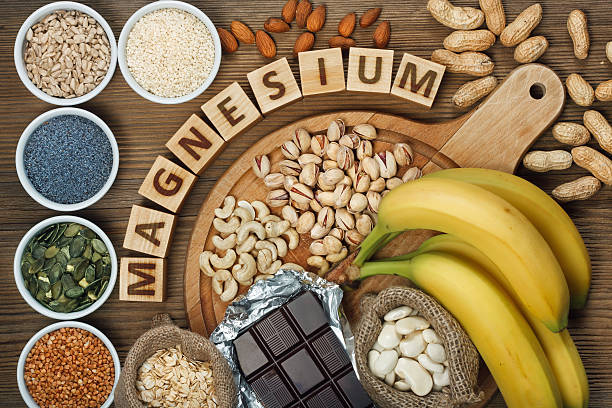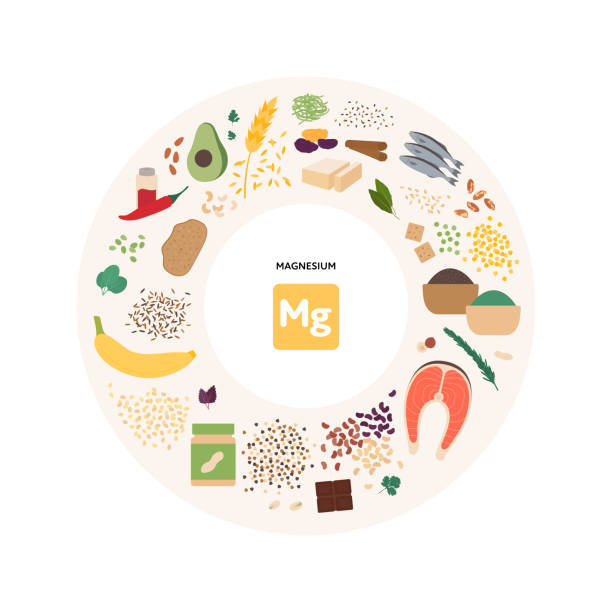When it comes to taking care of our health, we are used to talking about vitamins and minerals. But have you ever wondered what these essential nutrients really do for our bodies? Vitamins are organic compounds that our body needs to function correctly. At the same time, minerals are inorganic substances that we need for different processes, such as building strong bones or transmitting nerve impulses. One of the most important minerals is magnesium, which is involved in over 300 enzymatic reactions in the body. Magnesium helps regulate glucose levels, which means it can help reduce insulin resistance – a condition linked to obesity. Plus, magnesium also helps reduce inflammation and stress, both of which can contribute to weight gain. So if you’re looking for a way to boost your weight loss efforts, adding more magnesium-rich foods to your diet might be the way to go.

Do You Need More Magnesium for Weight Loss?
Our body requires this vital nutrient for several biochemical reactions. The benefits of having magnesium are significant. It is possible for people not to get enough magnesium from their diet. Spinach is another wonderful vegetable to add to your meal. Depending on where you live, you can find magnesium in your meals.
Experience the Magic Behind Magnesium and Weight Loss
Taking magnesium does not help with weight gain. Magnesium reduces abdominal fat through consuming wholesome food, regular exercise, as well as enough calories. This occurs as magnesium causes less fasting sugar and insulin (indicator for body weight) and helps people who are overweight. The more insulin passes in your bloodstream, the higher your insulin levels. This extra glucose goes directly through the stomach for processing, which results in extra fat.
Low Magnesium May Lead to Emotional Eating
We have lower serotonin levels when blue, an ’emotional’ hormone that controls appetite. Sunlight must produce serotonin; unless you live in a country like the United States, you may find the lack during long dark winters. When serotonergic energy runs throughout our bodies, it can make us feel more satisfied – a feeling often lost in food. Magnesium aids in converting amino to serotonin, regulates appetite and affects mood significantly. Getting enough magnesium reduces stress and depression and makes it easier to eat healthier.
Low Magnesium Kick-Starts Sugar Cravings
If magnesium levels are high, it isn’t just an overeating problem. Having too much sugar is the key to boosting your appetite. Low magnesium levels in your brain can cause sugar cravings. Without sufficient magnesium, glucose is unable to get into your system. Instead of utilizing sugar as energy, your body stores weight in the middle. Sugar depletes our magnesium stores, and we’re easily thrown into this vicious cycle.

Have you ever wondered how much magnesium you need in your diet?
It might surprise you that magnesium is a crucial mineral involved in over 300 different bodily functions! It’s responsible for helping to regulate everything from blood sugar levels to muscle and nerve function. And fortunately, getting your daily dose of magnesium is as easy as ordering a meal at your favourite restaurant. Many restaurants offer magnesium-rich dishes like spinach, almonds, and avocado. So the next time you’re out to eat, get your fill of this essential mineral. Your body will thank you for it!
Magnesium Support Bone Health
Magnesium is just as important as Calcium when it comes to bone health. Low magnesium levels in the body can increase the risk of bone fracture. And that’s not all – magnesium is also essential for reducing inflammation and keeping calcification healthy. You see, once bones degrade, they become more susceptible to breaking. And on the flip side, studies have shown that higher magnesium levels in the body are associated with greater bone density. So, if you want strong, healthy bones, remember magnesium!
Better Sleep Quality With Magnesium
Eating magnesium-rich snacks will help you sleep more easily. People who enjoy magnesium swear that the substance helps relieve tension and relaxes your nervous system so you can sleep better. This research has already focused on magnesium & sleep. A very interesting study has demonstrated that magnesium improves sleep quality in insomnia.
Magnesium ‘Magic’ – Lose Weight, Sleep Better, and Boost Your Mood
Magnesium helps improve teeth and gum health. Many suffering from magnesium aficionados quickly experience noticeable benefits once their problem is resolved. Once the nutritional deficit has been addressed, the benefits have already begun to appear throughout the body. Imagine not having to struggle with weight and feeling happier when taking magnesium supplements or food – this is a common result for my magnesium tests.
Magnesium Benefits.
Magnesium is a mineral that packs a powerful punch. Not only does it help calm us down and provide an ideal place to rest, but it can also be useful in relieving various issues, such as PMS, depression, and migraines. Additionally, it plays an essential role in the formation of our bones and supports healthy bones and can even halt osteoporosis. And let’s remember its ability to release symptoms of anxious feelings and lower blood pressure. Magnesium is even beneficial for treating chronic conditions and can improve overall fitness. Best of all, it’s safe to consume and supports weight loss and shaping.
Magnesium Normalizes Blood Sugar And Protects Against Diabetes
Magnesium stabilizes blood glucose levels in diabetic patients. Tell me the reason for the explanation. Diabetes is caused when insulin resistance causes your body to metabolize glucose. It causes metabolic syndrome and type 2 diabetes. Type 2 diabetes usually has lower levels of magnesium. Researchers believe magnesium is essential for maintaining healthy body glucose levels. The supplement of magnesium also affects blood sugar. A person who consumes little magnesium is more likely to develop diabetes.

Foods High in Magnesium
There are numerous sources of magnesium available to us. Unfortunately, most of us do not eat enough. It’s also true that magnesium-filled food is delicious and healthy too! My favourite foods include almonds, avocados, corn tortillas, and steamed avocados. However, you may need more magnesium when you’re on an active diet.
Reduce High Blood Pressure To Support Your Heart
Often the heart is forced to work harder, which causes heart problems. Magnesium deficiencies can cause cardiovascular and respiratory problems. Eating foods rich in magnesium can help prevent heart attacks and strokes. Researchers have demonstrated that magnesium can lower blood pressure.
Boost Exercise Performance
Magnesium increases the strength and power of an exerciser by increasing its energy production. In exercise, it has been proven we need about 10% to 20% more magnesium. Several studies show magnesium can increase the fitness performance of people, from athletes to those with chronic conditions. The study found faster runs in athletes supplemented with magnesium.

Improves and Prevents Migraines
I haven’t experienced migraines yet, but you’re lucky to be. The symptoms can be severe nausea, light sensing, or vomiting. A poor magnesium intake may cause headaches. It’s known that eating magnesium reduces migraine symptoms. Some studies suggest magnesium may help to reduce migraines. During migraines, magnesium was shown to reduce pain and inflammation.
What are the Symptoms of Low Magnesium?
Have you been experiencing restless feet lately or dealing with annoying heartburn? These could be signs of low magnesium! Headaches, insomnia and weakened limbs can also be symptoms of magnesium deficiency. And it’s not just physical symptoms; it’s linked to; magnesium deficiency is also linked to chronic diseases such as diabetes and hypertension. So, keep a balanced diet with plenty of magnesium-rich foods throughout the day to keep your body in tip-top shape!
What type of magnesium is good for weight loss?
Magnesium Citrate (MC), a mineral that helps digestion, increases blood circulation and reduces bloating in the bowels. This potent mineral has been shown to aid in digestion, reduce bloating, and assist with weight reduction. By softening and speeding up stool movement, magnesium citrate helps to move toxins out of your body and prevent excess weight gain.
Does magnesium speed up metabolism?
Magnesium might be your secret weapon if you’re looking for a way to rev up your metabolism. This essential mineral is critical in regulating your body’s metabolic rate, or the rate you burn calories. But that’s not all — magnesium is also essential for keeping your muscles healthy and strong, which is critical to supporting an active lifestyle. And if you’re trying to lose weight, magnesium may help there too. Some studies have found that getting enough magnesium can help reduce body weight and enhance weight loss efforts. So, whether you’re an athlete looking to optimize your performance or just trying to shed a few pounds, adding more magnesium to your diet could be smart.
What vitamins are good for losing belly fat?
If you want to shed that stubborn belly fat, you should focus on getting more vitamins into your system. Specifically, B vitamins have been known to help convert food to energy, especially those carbs and fats that tend to accumulate in your midsection. Vitamins like Iron and Magnesium also regulate your metabolism, while Green Tea has been shown to boost fat-burning abilities. And don’t forget about Calcium – not only does it promote healthy bones, but it also helps regulate hormones and enzymes involved in fat metabolism. So next time you hit the grocery store, stock up on foods high in these key vitamins to kick-start your belly fat loss journey!
Does magnesium help with bloating and water retention?
That’s right! This powerful antioxidant has been found to decrease symptoms of stomach bloating while also helping to control insulin sensitivity when consuming foods that contain too little sugar. And that’s not all – magnesium has also been linked to decreased depression and fatigue. So if you’re feeling bloated or experiencing water retention, consider adding some magnesium-rich foods to your diet to help alleviate those pesky symptoms.


Leave a Reply